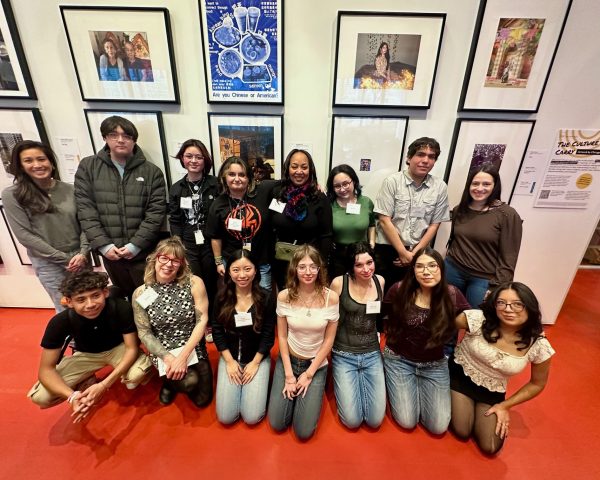Younger generations are moving away from socialism’s historical taboo
For decades socialism has been a word charged with so much antagonism, as it has long been considered a vague, amorphous threat looming over America.
While the definition of socialism details that the means of production are owned by the people, which results in a more equal distribution of wealth, and often results in more government funded programs for the benefit of the people, that definition is often warped by the politics surrounding the word. Yet this is rapidly changing as younger generations become more educated on the actual definition of socialism, disentangle it from communism, and even advocate for the implementation of socialist policies.
Recent research from the Pew Research Center confirms this as younger people are more likely to view socialism positively than older generations, as 44% of those aged 18 to 29 view socialism somewhat to very positively compared to 28% of those 65 and older.
There are a couple reasons as to why this is, including the impact of the current economy on younger people and distance from the Cold War, according to Kei Kawashima-Ginsburg, the director of the Center for Information and Research on Civic Learning and Engagement at Tufts University, in an NPR article.
Peter Vlahos, a Lane microeconomics teacher, also discussed how the economy could have impacted Gen Z and millennials’ views of socialism in contrast to capitalism.
“It’s almost like a no-win situation for [Gen Z and millennials]. You know, they’re told from the time they’re in high school, you have to go to college. But then college becomes, you know, very expensive. And then, they take out a lot of debt. And that debt has been growing, at the fastest rate of any other type of debt,” said Vlahos.
As a result of this, it makes sense that younger generations would favor policies and politicians who want the government to intervene in the economy for the benefit of the people. An example that would solve the issue Vlahos referenced would be the government forgiving student debt or reducing the cost of college tuition.
In addition to the economy having an influence on ideology, there is also the fact that younger generations did not live through the Red Scare of the 1950’s and McCarthyism or the Cold War. They are generally not raised by people who were fed anti-communist propaganda and who were not taught the clear differences between socialism and communism, and as a result are able to approach the subject with a much clearer mind. At this point, students now are more likely to associate socialism with Scandinavia than with the Soviet Union, according to Kawashima-Ginsburg.
This has been observed at Lane Tech by both students and teachers who note that the way people talk about socialism has shifted significantly. One history teacher, Emily Freedman, says that she has seen this within her six years at Lane.
“Earlier on, I did have more students who, when we would talk about it, they’d be like, ‘whoa let’s pull back from that.’ But the students today, I think, are more accepting of [socialism] and they don’t necessarily come in with those preconceived notions…it definitely carries less of a taboo,” said Freedman.
Senior Aspen Behm has similar thoughts. Though they feel the word does still carry a negative connotation, they’ve seen people be more open to socialist policies being discussed and implemented.
“I think there’s an increasing acceptance of some of the ideas of socialism when they become disconnected from the term itself, because there is still a stigma attached to the word, but I don’t think there’s as much of a stigma around the concept,” Behm said.
Freedman noted that while current students do not have the same prejudices as past generations of students, many of them also come in able to recognize the differences between socialism and communism more easily. Social media could be responsible for this observation, and Behm said that it has been a significant source of information for students that introduces them to socialism earlier, but has also led to some disparities in accurate conceptions.
“I think that’s another reason that our ideas of it are so different. Kids aren’t receiving unbiased sources on this stuff, unless they seek it out themselves,” said Behm.
School, however, is a place where teachers are trying to present unbiased and educational information on socialism in contrast to previous generations. Freedman, who is a millennial, says that the Cold War did skew the way socialism was discussed in school.
“All of our teachers grew up with that Cold War mentality. When it was taught to me growing up it was like ‘we’re not going to dive too deep into this because we know it causes people to automatically close up,’” said Freedman. When she is teaching, however, she keeps the discussion of socialism as unbiased as possible.
“I really try and stick to the technical definitions, but also the understanding that some of these systems are full-blown, all-encompassing systems. You don’t just have a touch of communism; communism is an all or nothing system. But socialism and capitalism, we have aspects of both,” said Freedman.
Behm, however, said they think that a fear of backlash has too much influence on the way schools talk about socialism.
“I have a lot of experiences with teachers who want to say something that more or less means socialism, but then skirt around terminology. We are taught that our teachers are supposed to be inherently nonpolitical in the way that they portray issues. But a lot of times, what that kind of ends up being is that you can’t talk about leftist politics at all,” said Behm.
Regardless of the perspective on the way socialism is addressed in schools, the truth remains that the way it is approached by both teachers and students has changed significantly. Younger generations are more open to socialism and are dissatisfied with capitalism, older generations are more closed off to socialism and strongly favor capitalism, and educators are striving to be apolitical as students receive masses of information from social media.
Socialism means the “government has control of the whole economy or aspects of the economy for the sake of the people,” according to Freedman, but at the end of the day, it has always been, and will most likely continue to be, a term intertwined with personal beliefs and influenced by the climate of the era.
Your donations directly fund the Lane Tech student journalism program—covering essential costs like website hosting and technology not supported by our school or district. Your generosity empowers our student reporters to investigate, write, and publish impactful stories that matter to our school community.
This website is more than a publishing platform—it's an archive, a research tool, and a source of truth. Every dollar helps us preserve and grow this resource so future students can learn from and build on the work being done today.
Thank you for supporting the next generation of journalists at Lane Tech College Prep!

Saskia is a senior, this is her third year with the Champion. She loves writing and editing, and is planning to pursue a career in English. She spends...



